Surfer SEO is an advanced, cloud-based tool designed to optimize on-page SEO through data-driven insights and AI-powered content suggestions. Using over 500 ranking factors, Surfer SEO provides actionable recommendations to help you rank higher on Google.
| Platform | Cloud |
| Tool Type | On-Page SEO Software |
| Price | $99 – $219 per month |
| Discount | Save 20% with annual billing |
| Promotion | 7-Day Money Back Guarantee |
| My Rating | 4.9 out of 5 stars ★★★★★ |
Continue reading to learn all about Surfer SEO's powerful features and functionality that can help you optimize your content to rank higher on Google.
BoostPlanner is reader-supported. If you buy through a link on my site, I may earn an affiliate commission.
What is Surfer SEO?
Surfer SEO is a data-driven on-page search engine optimization tool. The tool uses machine learning and AI to audit sites on the SERPs and provide optimization insights.
Surfer was founded in 2008 by agency owner Slawek Czajkowski. The company is based in Wroclaw, Poland. Currently, Surfer is used by more than 10,000 businesses.
Surfer SEO maintains a high rating in the SEO software category, earning positive reviews on leading product review sites like G2 and Capterra.
Based on customer reviews, many people consider Surfer SEO to be one of the best tools on the market for on-page SEO insights and optimizing content to rank.
The most commonly mentioned Surfer SEO features in reviews online are the content editor, SEO audit, and SERP analyzer.
Pros
- Excellent user interface for optimizing content.
- Quickly find out what topics and keywords to write about.
- Leading SEO software for optimizing on-page keyword usage.
- In-depth topic and keyword research for content planning.
- Create an entire content strategy with the provided ideas.
- Advanced auditing of website pages based on competition.
- Get extensive SERP and competitor on-page insights.
Cons
- Pricey for small projects or operations.
- The learning curve to understand all features.
Surfer SEO Pricing
Surfer SEO offers three primary plans as well as custom plans for larger needs.
| Feature | Essential | Scale (Top Pick) | Enterprise (Custom) |
|---|---|---|---|
| About | Ideal for starting solo freelancers and marketers | Ideal for marketing teams and scaling content production | Custom solutions for more volume, control, security, training, and support |
| Content Editor | 30 pages / month | 100 pages / month | Custom |
| AI Articles | 5 articles / month | 20 articles / month | Custom |
| Content Audit | Track 200 pages | Track 1000 pages | Custom |
| Topical Maps | 100 searches / day | 100 searches / day | Custom |
| Keyword Research | 100 searches / day | 100 searches / day | Custom |
| Page Audit (add-on) | 100 audits / month | 100 audits / month | Custom |
| SERP Analyzer (add-on) | 100 searches / day (+$29) | 100 searches / day (included) | Custom |
| Rank Tracker (add-on) | 200 keywords (+$17) | 200 keywords (+$17) | Custom |
| Auto-Optimize (add-on) | 30 credits / month | 100 credits / month | Custom |
| Humanize | 50,000 words / month | 100,000 words / month | Custom |
| Plagiarism Checker | Included | Included | Included |
| Invite Team Members | 5 | 10 | Custom |
| White Labeling | No | No | Yes |
| Onboarding Call | No | Yes | Yes |
| API Access | No | No | Yes |
| Support | Email + Customer Success Team | ||
| Price | $99 per month | $219 per month | Contact for pricing/demo |
Surfer SEO pricing starts at $99 per month.
The Essential plan starts at a rate of $99 per month if you sign up for an annual subscription. An annual plan saves you 20% on any Surfer SEO plan.
Surfer's Essential plan is suited for small site projects, freelance content writers, bloggers, or SEOs who only need to write or optimize 30 or fewer articles a month.
The Scale plan is the most popular option for many digital marketers since you can edit and audit 5 times the number of articles and pages.
Surfer SEO Features
Surfer SEO includes features for keyword research, content planning, SERP analysis, and on-page optimization based on data from top-ranking sites in Google SERPs.
In my opinion, Surfer SEO is worth using for its content editor, SEO audit, and SERP analysis tools, to uncover the words and phrases to use to potentially improve rankings.
In this review, we break down the following Surfer SEO features:
- Content Editor
- SEO Audit
- Content Planner
- SEO Audit
- Keyword Research
- Keyword Surfer
- Content Audit
Learn more about each feature in detail below.
1. Content Editor
The Content Editor is Surfer’s flagship feature, known for its powerful, real-time SEO recommendations.
This tool provides instant, data-driven guidance as you write, helping you optimize your content based on analysis of top-ranking competitors for your target keywords.
By entering one or more keywords, the Content Editor generates SEO guidelines tailored to your specific topic, including recommended terms, structure, and keyword density.
For a deeper understanding of how to use the Content Editor, here’s a quick video guide:
Setting Up the Content Editor
Below is the page used to set up the content editor.
To create a new content editor, you simply enter one or more keywords that you want to optimize your next piece of content around.
Then, you choose a location to search from and select desktop or mobile search results. These settings define the type of search results that Surfer SEO will use to search your keywords and gather the most relevant insights to improve rankings.
As you create more content editors for different keywords, Surfer will save your content editor history. You can search by keyword or tags to quickly find a previous editor.
Your plan's content editor monthly limit is also displayed, informing you of how many remaining unique queries (keywords) and content editors are available to use.
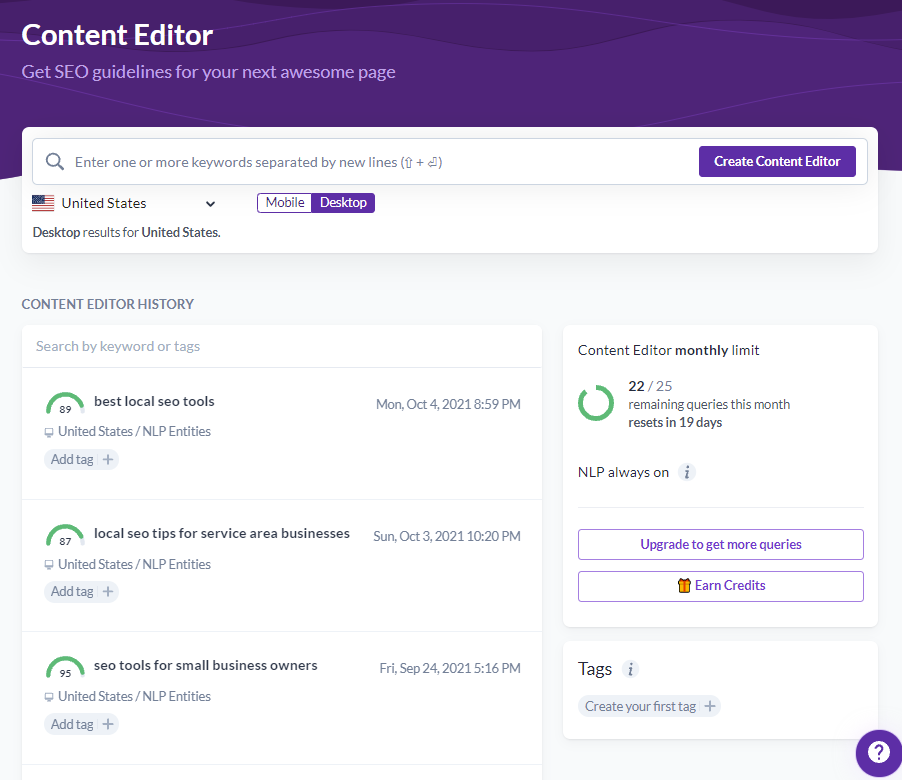
Inside the Content Editor
Once you enter your desired keywords and select “Create Content Editor”, you're presented with the content editor view and a side panel that includes the SEO content guidelines, additional insights, and customization options.
This is where Surfer shines as a content optimization tool for SEO.
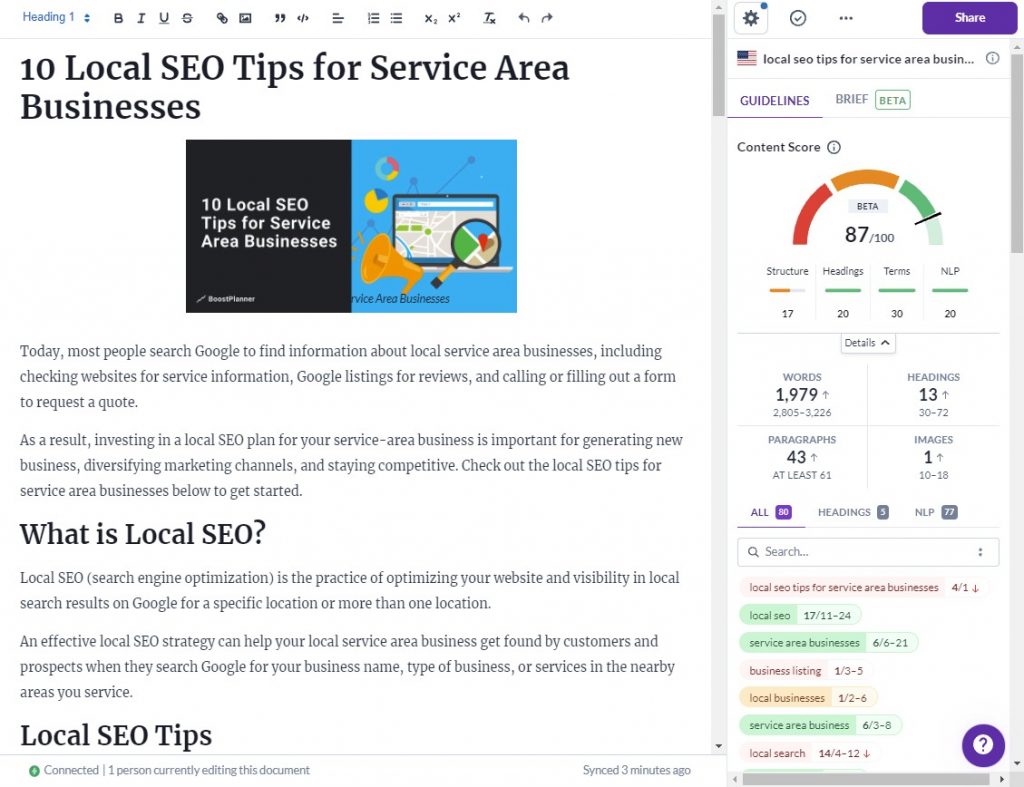
Surfer's content guidelines show you potential terms to use based on the content of the top-ranking competing pages for your search query or queries.
This includes terms found in the body, headings, and words based on LSI keyword analysis, machine learning, and natural language processing (NLP analysis).
Surfer uses Google's NLP API to extract data about entities and sentiment. This process is used to better understand the main keywords or phrases on a page by looking at the content surrounding them.
Surfer then processes the data further based on what's called True Density, or the saturation of each important word and phrase in the context of a given keyword.
Filter the Visibility of Specific Terms
Oftentimes, Surfer will show you hundreds of possible terms to incorporate into your content creation. This includes both suggested LSI keywords and phrases.
To make it easier to focus and optimize your content for specific terms, you can filter terms with the given search bar found in the side panel.
Filter terms based on if they're optimized, partially optimized, or not optimized.
You can also show ranges next to each term, which suggests the minimum and maximum times to use a term in your piece of content and existing occurrences.
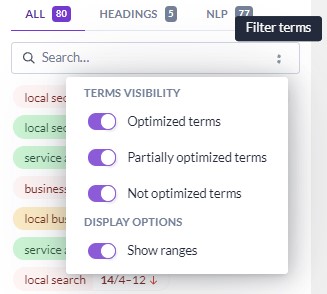
As you write and incorporate suggested terms, the SEO score is updated in real-time.
The Content Editor's Brief Section
The Brief section of the content editor includes an outline builder, a notes section, competitor page links based on the search query targeted, and topics & questions pulled from the “People Also Ask” section of Google's search results.
This information is helpful for creating more comprehensive content with a higher potential of showing up as featured snippets in Google Search results.
You can also use the insights from the content editor's brief section as a way to find ideas and inspiration for either editing, expanding, or creating new content.
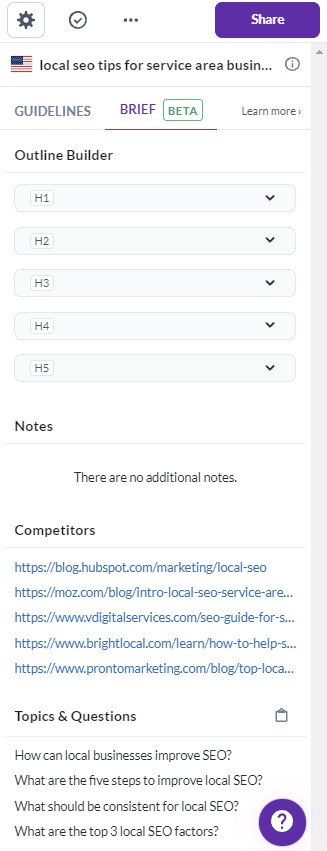
The Outline Builder in the Content Editor Brief
The outline builder feature surfaces headings and paragraphs that are uniquely generated based on the content of the top 10 ranking competitors.
You can click on the displayed clipboard icons to quickly copy and paste the content right into the editor to help boost your content score and topic relevancy.
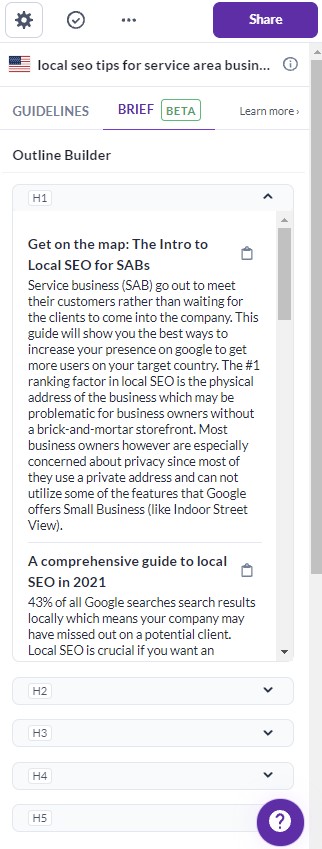
Organic Competitor Options for Content Editor Guidelines
In the upper-left corner of the SEO guidelines side panel, there's a gear icon you can click on to navigate to options where you can review and adjust the guideline results.
Clicking the icon first opens up the organic competitors that are currently being tracked for use in the SEO content guidelines analysis.
Toggling on a different set of competitors will update the content structure and terms to use in your content, which affects the content guidelines and content score.
In the Organic Competitors table, you can choose to display the following for a quick snapshot of competitor content insights and estimated traffic.
- Domain Authority
- Breadcrumbs
- Content Score
- Total Words
- Breadcrumbs
- Descriptions
- Domain Traffic
- URL Traffic
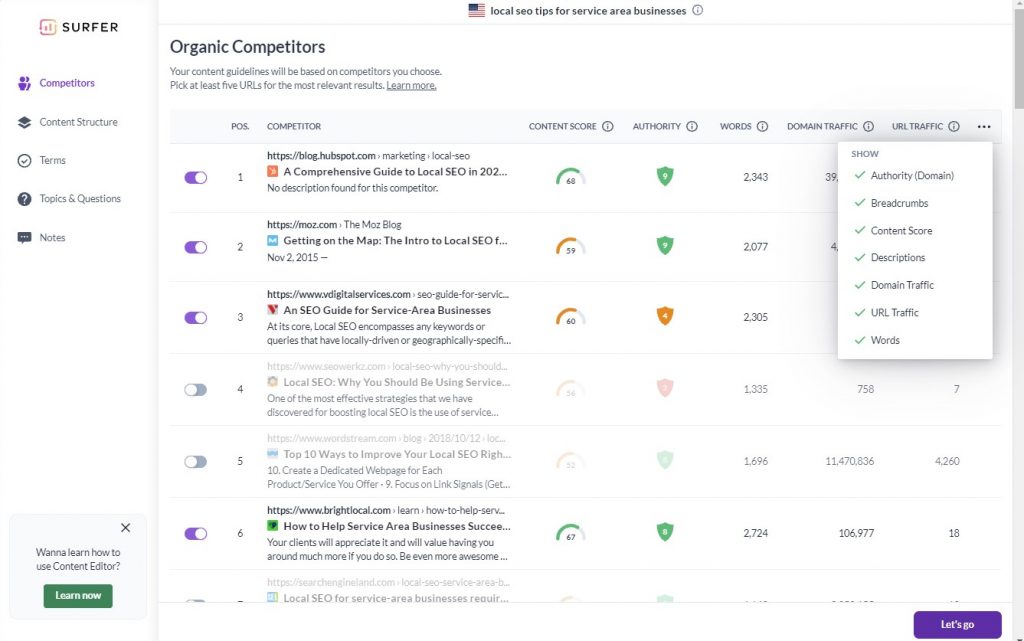
Content Structure Options for Adjusting Content Score
The second section of the content editor options interface lets you adjust the content structure that affects your content score.
Adjusting the content structure values could be useful if you end up noticing some discrepancies between Surfer's guidelines and the live content in search results.
As a regular user of Surfer, the software tends to be pretty accurate. So far, I have only noticed minor issues with detecting page images, which can affect the content score.
You can change the number of words, headings, paragraphs, and images.

Terms to Use Settings for Content Editor Guidelines
The next section of the options side panel lets you adjust the terms to use and focus on while optimizing your content.
These are the prominent words and phrases that Surfer extracts based on the main keyword you selected when starting a new editor and competitor analysis.
You can exclude terms, mark terms as heading, or select all terms.
Depending on your main search query, you can keep scrolling down this list to discover more terms to add to the SEO guidelines panel and incorporate into your content.
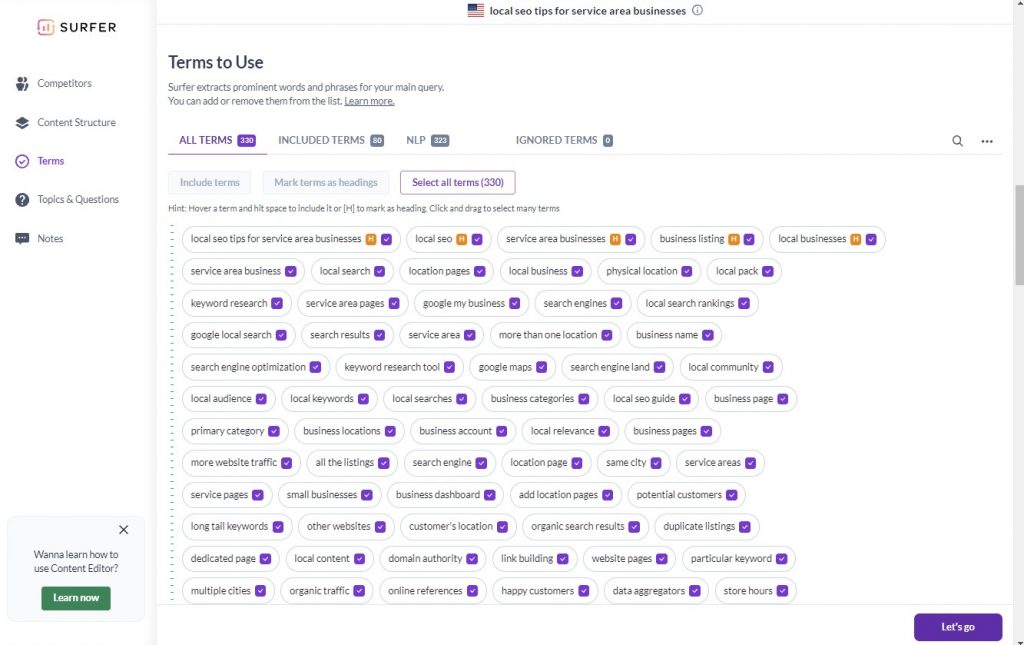
Topics & Questions for the Content Editor Outline
The topics and questions section of the content editor options surfaces relevant topics and questions you might want to answer in your content.
When you toggle these on, they will appear in the side panel of the content editor under the Outline section.
These topics and questions are extracted by Surfer from both top-ranking pages and the “People Also Ask” box that appears in Google's search results.
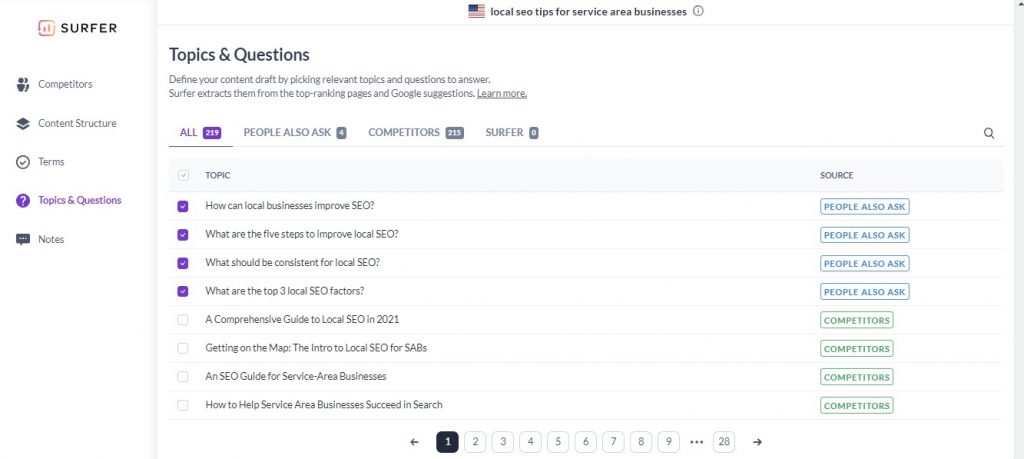
Content Editor Extension
Surfer provides a Google Chrome extension that gives you the optional ability to integrate the Surfer content editor with WordPress and Google Docs.
While I have had no issues copy-pasting between WordPress and Surfer's editor, this Chrome extension ensures there are no formatting problems when doing so.
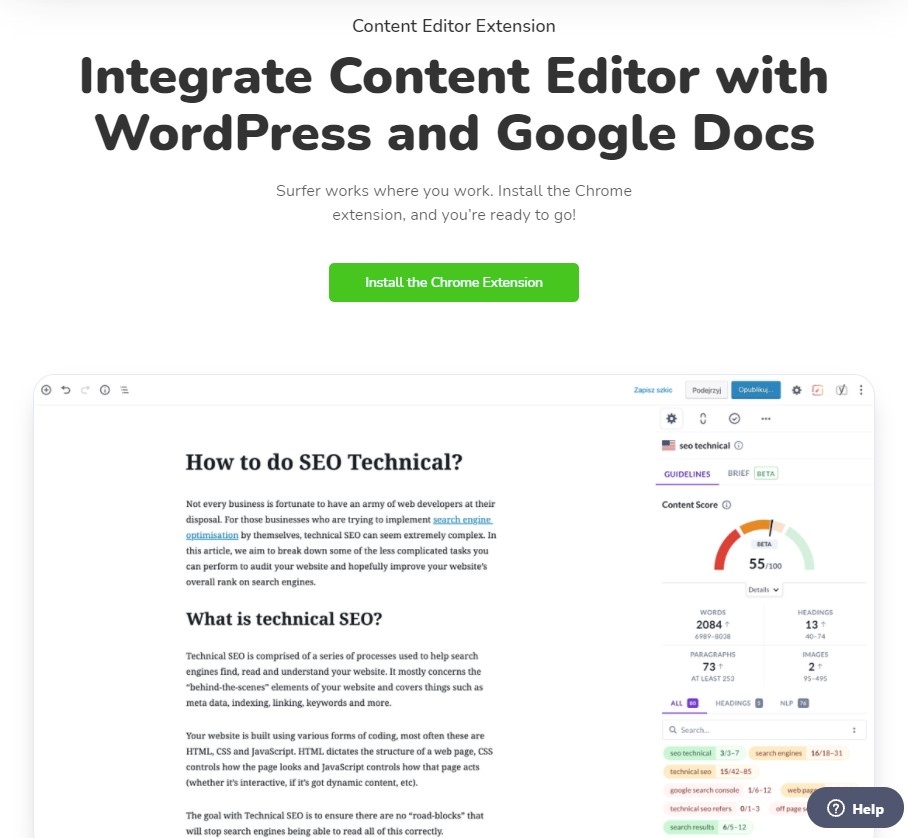
2. Content Planner
The Content Planner is a powerful tool in Surfer SEO that helps you build a comprehensive, SEO-focused content strategy.
This feature generates keyword clusters and topic ideas, allowing you to identify primary and supporting pages for your site.
By mapping out relevant topics and associated keywords, the Content Planner enables you to create a structured roadmap that supports long-term SEO growth.
It's an invaluable resource for refining your keyword research and ensuring your content strategy covers essential topics for your target audience.
Setting Up the Content Planner
Based on a keyword or website domain, Surfer will map out relevant keyword clusters.
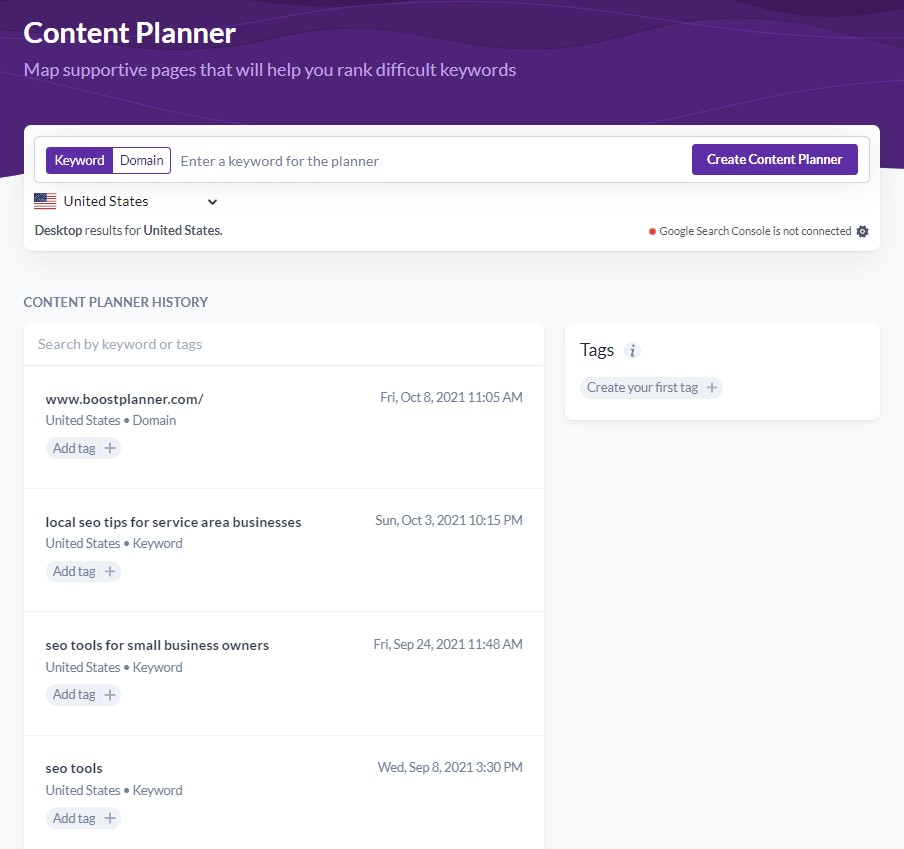
Content Planner Summary Page
On the content planner summary page, Surfer displays hundreds of keywords grouped into topics or keyword clusters that are related to the main topic.
The total estimated search volume is conveniently displayed in the upper-right corner of each topic cluster. You can sort topic clusters by relevance or search volume.
Depending on the main topic, you can also filter topic clusters by:
- Content Score – Available if you created a content editor for the main topic.
- Intent – Local, customer investigation, informational, or shopping.
- Keywords – Select a specific keyword cluster range.
- Search volume – Choose a specific search volume range
You can click on the down arrow icon to export all the content planner data to a CSV file to view topic clusters, keywords, and their search volumes in a spreadsheet.
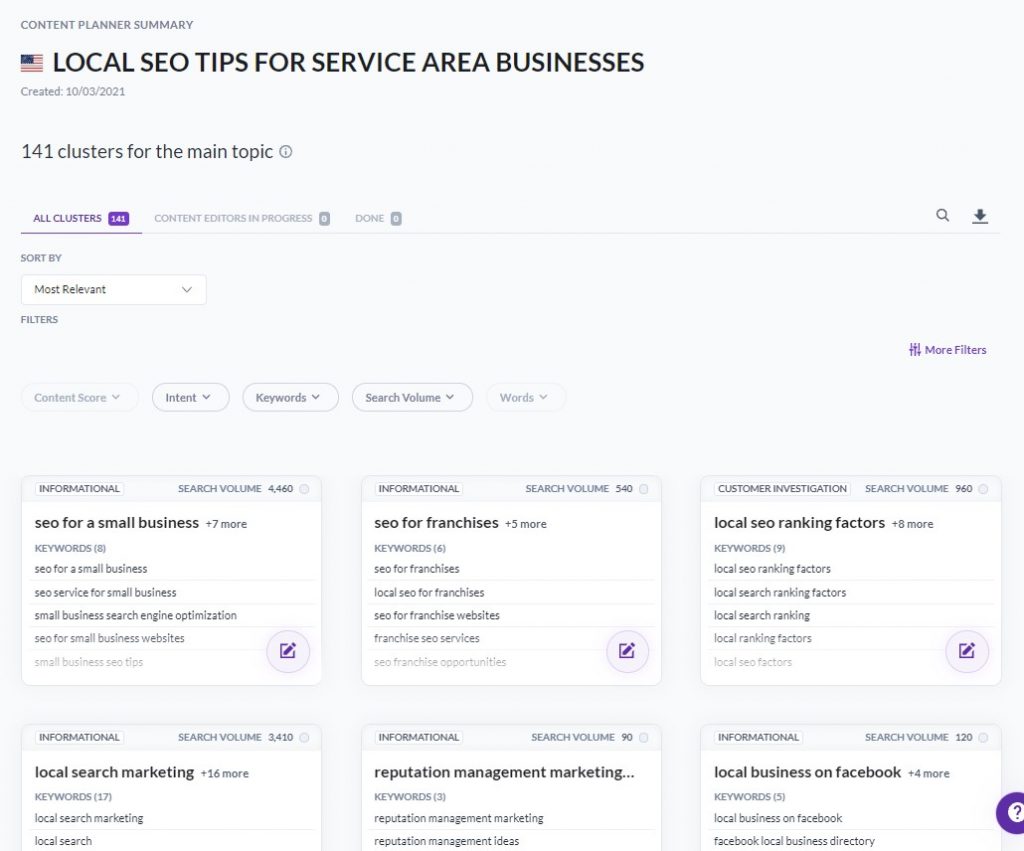
Keyword Cluster in Content Planner
Clicking on a specific keyword cluster opens a detailed view that shows the monthly search volume and total traffic of the groups of keywords that make up the cluster. The search volume of each individual keyword is also displayed.
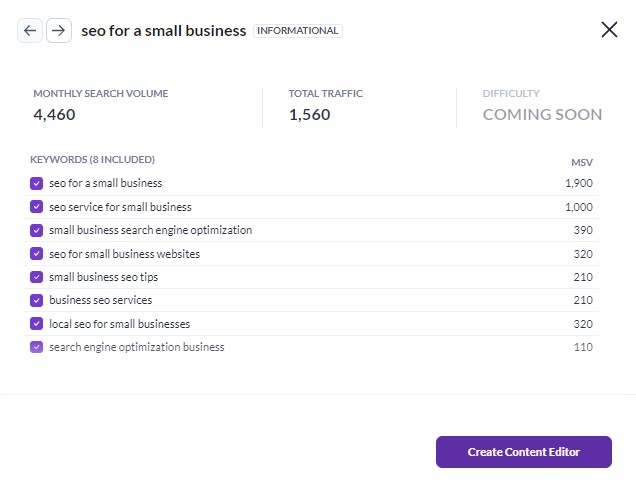
3. SERP Analyzer
The SERP Analyzer reveals the elements Google prioritizes in top-ranking pages, giving you a clear competitive edge in content optimization.
This tool allows you to compare and analyze top-ranking pages in Google’s SERPs across various ranking factors, providing valuable insights into what’s working for your competitors. You can also export the data for use in custom SEO reports, making it easy to integrate Surfer’s findings into your broader SEO strategy.
Working alongside the Content Editor, the SERP Analyzer is a powerful tool for in-depth competitor analysis and content auditing. It provides correlational SEO insights that help you understand the types of content and specific elements Google favors for your target keywords, guiding you in crafting content with stronger ranking potential.
Setting Up the SERP Analyzer
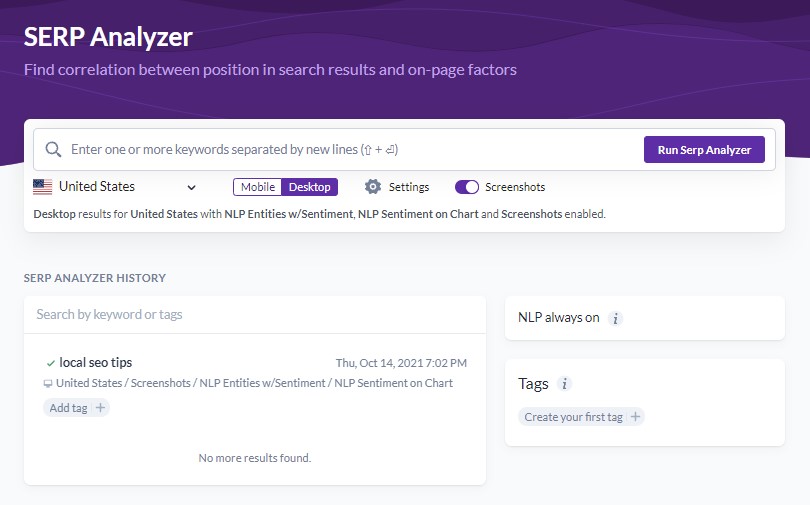
SERP Analyzer Chart View
After entering one or more keywords and selecting “Run Serp Analyzer”, the SERP Analyzer interface will appear, loaded with a ton of data to compare and contrast.
Let's take a look at the SERP Analyzer in more detail.
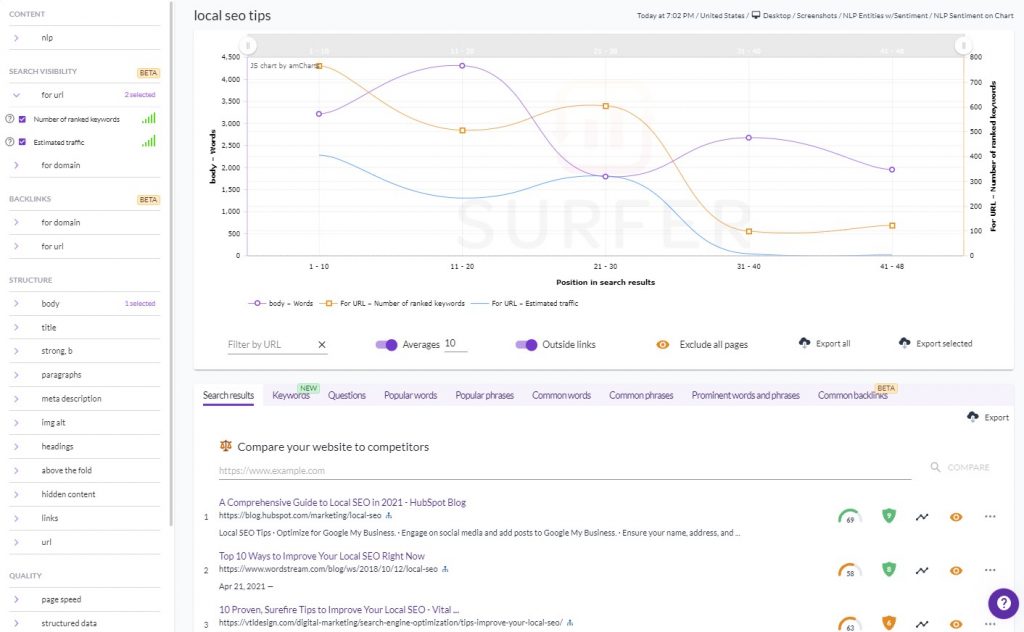
Search Results in SERP Analyzer
The first SERP Analyzer tab below the chart view displays a list of top competitor sites based on your submitted keyword.
Additional metrics and options are shown to the right of each competitor page snippet:
- The content score of the competitor page for the keyword.
- Domain score which reflects the strength of the page's backlink profile.
- Toggle competitor pages on or off in the above chart to compare ranking factor metrics.
- Exclude competitor pages from showing in the chart.
- Option to send a competitor page over to Surfer's page audit tool.
- Get a screenshot of a competitor page.
- View a content outline based on a competitor page's content.
And this is just the first tab of Surfer's SERP Analyzer! 🤯
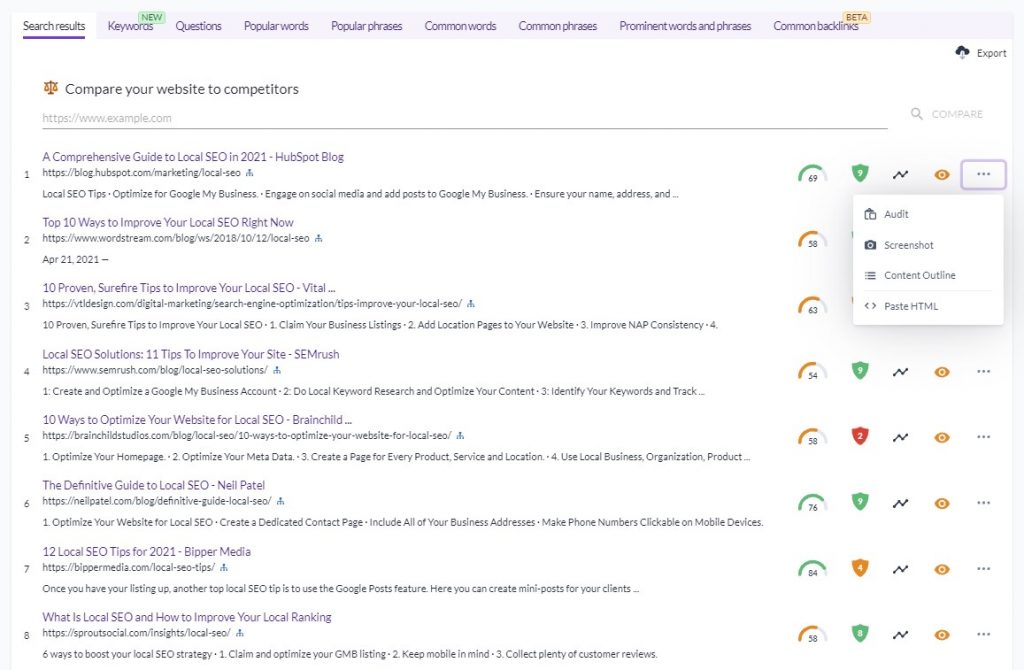
Content Outline in SERP Analyzer
Here's an example content outline based on the content of a competitor shown in the SERP Analyzer.
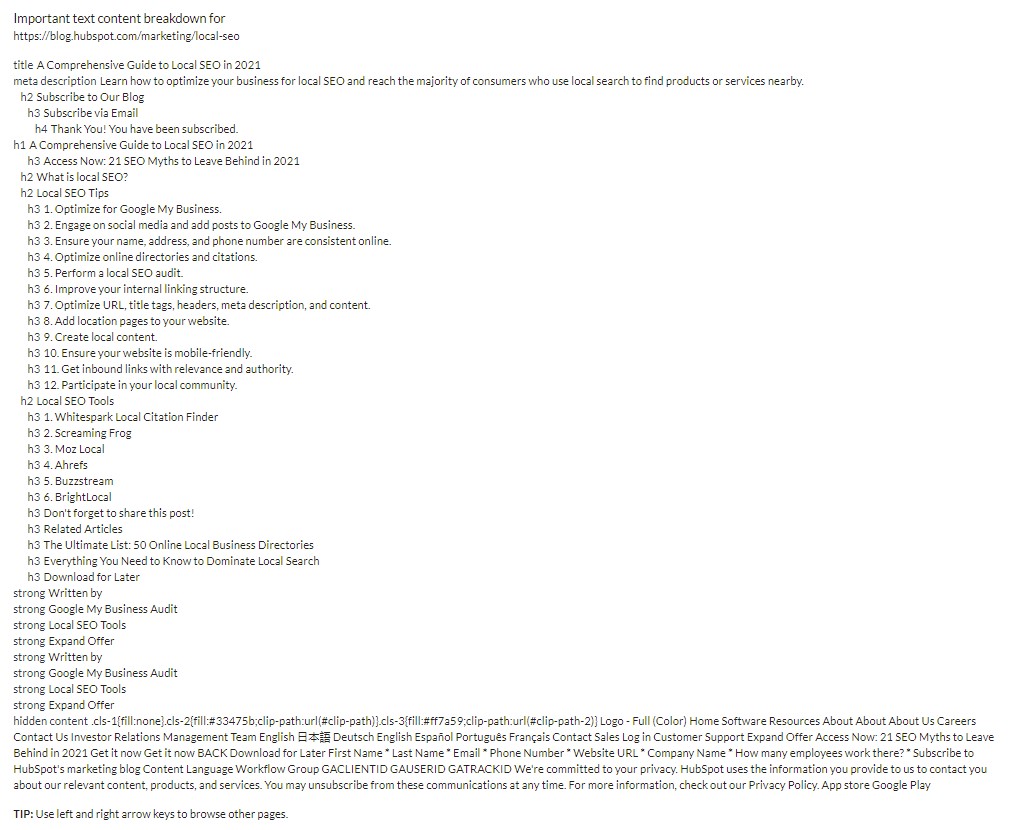
Keywords in SERP Analyzer
The next tab shows the common ranked keywords that the competitor page URLs rank for with keyword metrics that include:
- The top 10 similar keywords for each keyword.
- Overlapping pages or the number of competitor pages ranking for each keyword.
- Monthly search volume estimates of each keyword.
- Relevance of each keyword based on competitors' traffic and search volume.
You can select which competitors you want to enable or disable, which will alter the keyword data.
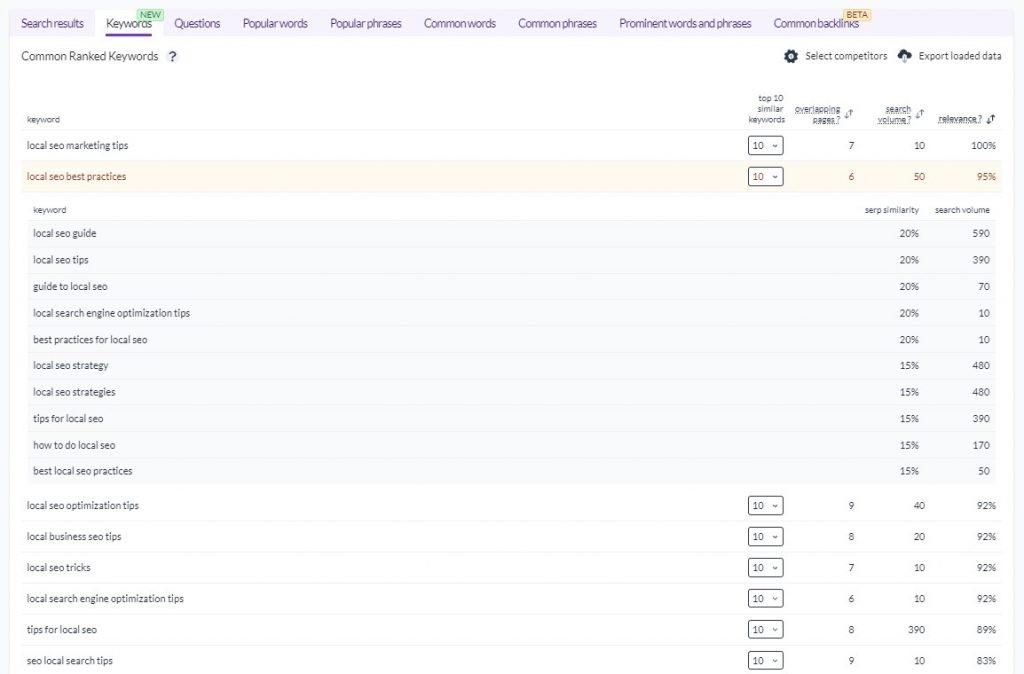
Questions in SERP Analyzer
The third tab includes questions that at least 2 of the top 20 ranking pages also rank for alongside the originally submitted keyword. Search volume and the number of overlapping pages are shown for each question.
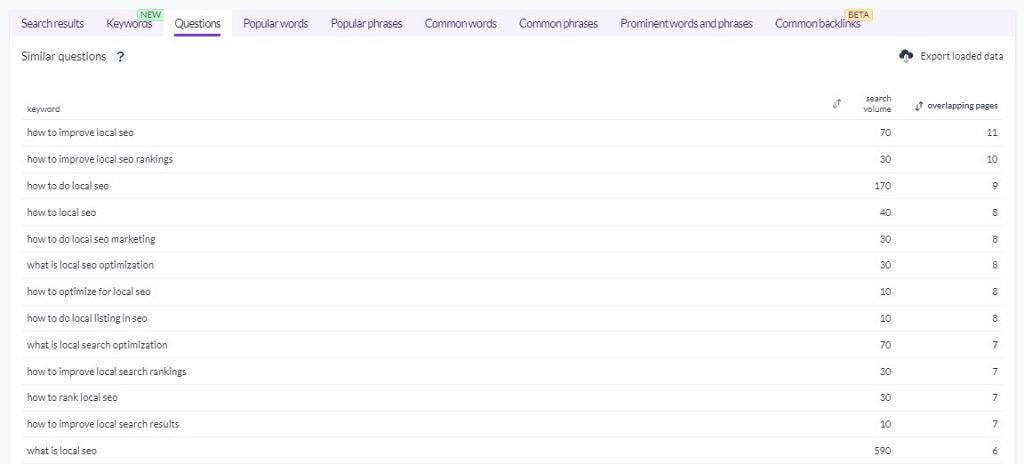
Popular Words in SERP Analyzer
The fourth tab displays popular words, which are defined by Surfer as 30 words that are used on each competitor page at least twice. The words are sorted by the number of occurrences and keyword density.
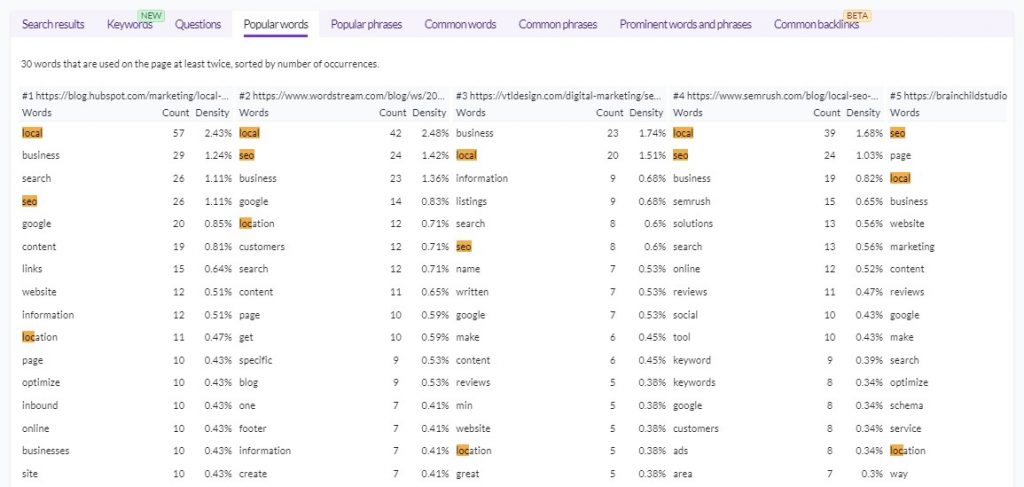
Popular Phrases in SERP Analyzer
The fifth tab shows popular phrases, which are 30 phrases up to 4 words long that are used on each competitor page at least twice. The phrases are sorted by the number of occurrences and keyword density.
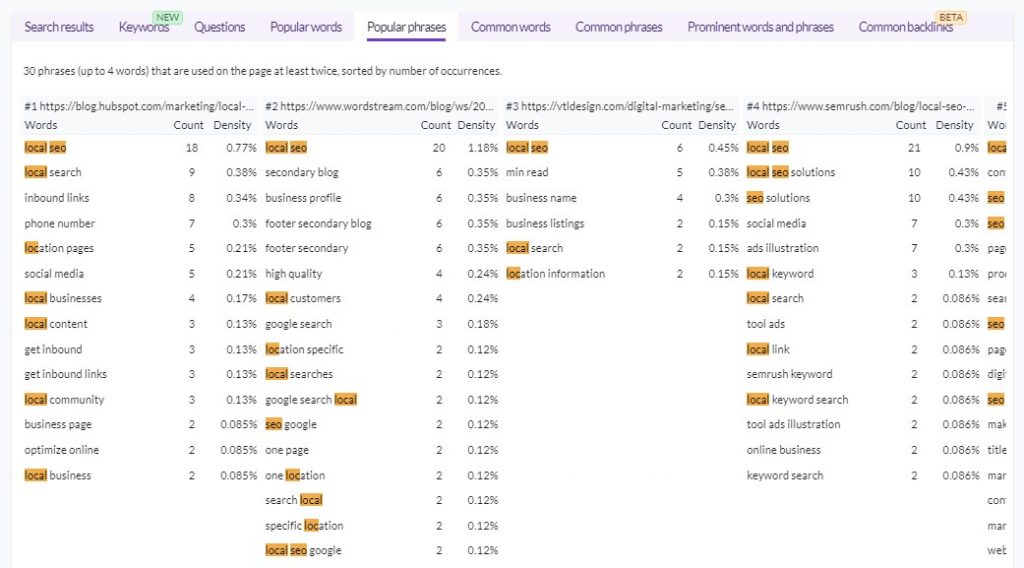
Common Words in SERP Analyzer
The sixth tab lists out words that are common among the top 10 ranking pages.
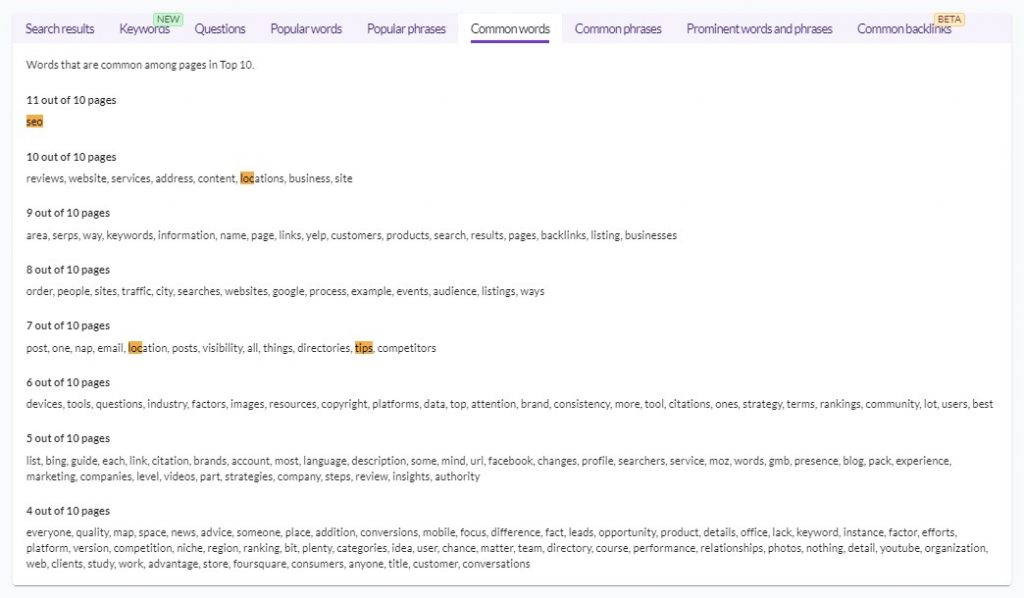
Common Phrases in SERP Analyzer
The seventh tab lists out phrases up to 4 words long that are common among the top 10 ranking competitor pages.
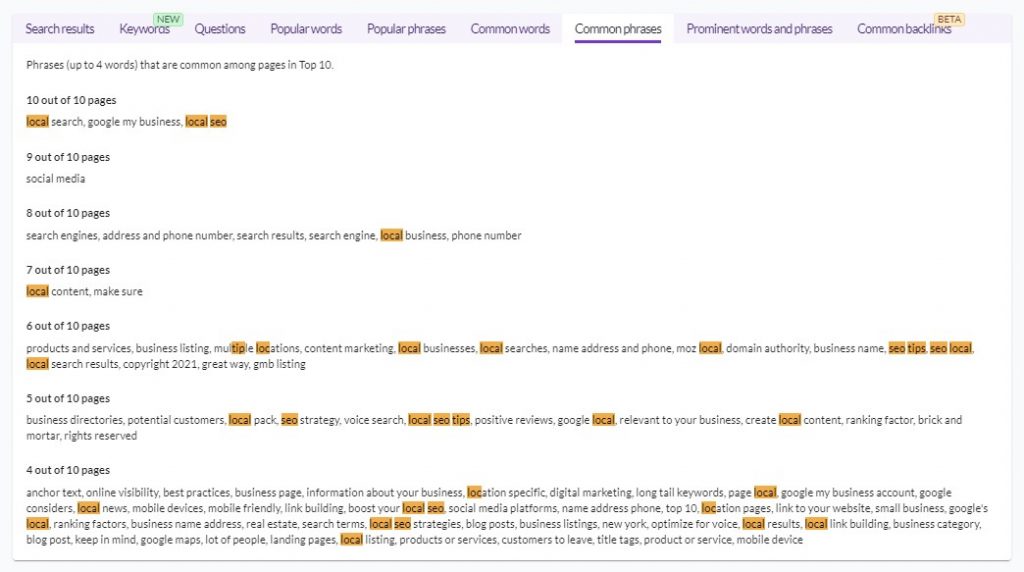
Prominent Words & Phrases in SERP Analyzer
The eighth tab displays words and phrases that appeared more than once on at least two competitor pages with related metrics including:
- Page frequency of each keyword.
- The keyword density based on the number of keywords per 100 words.
- The number of phrases.
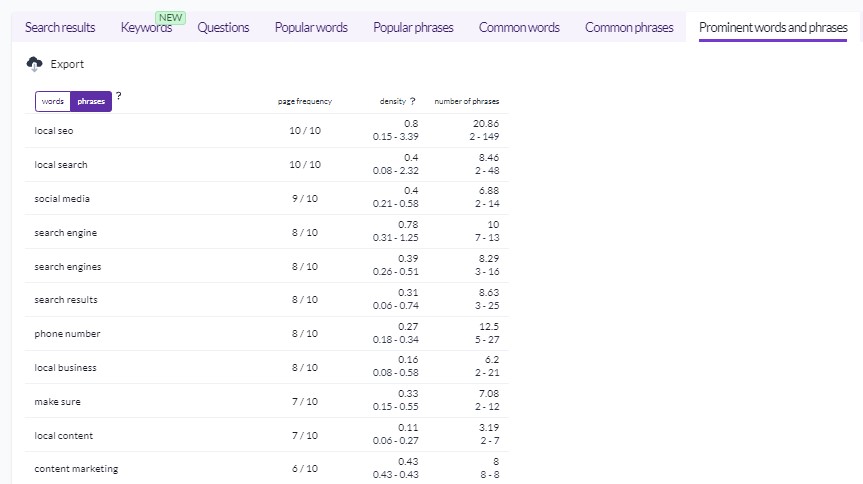
Common Backlinks in SERP Analyzer
While Surfer's features primarily focus on competitor analysis and optimization related to content writing, the ninth tab surprisingly offers off-site SEO data!
This tab shows the common referring domains for the top 20 ranking pages including:
- The number of competitor domains from the top 20 that have acquired the backlink including the specific referring page linking to the competitor and its estimated traffic.
- The total number of referring domains that the backlinking sites have acquired provides insight into the strength of the common referring domains.
- Estimated traffic the common domains are generating.
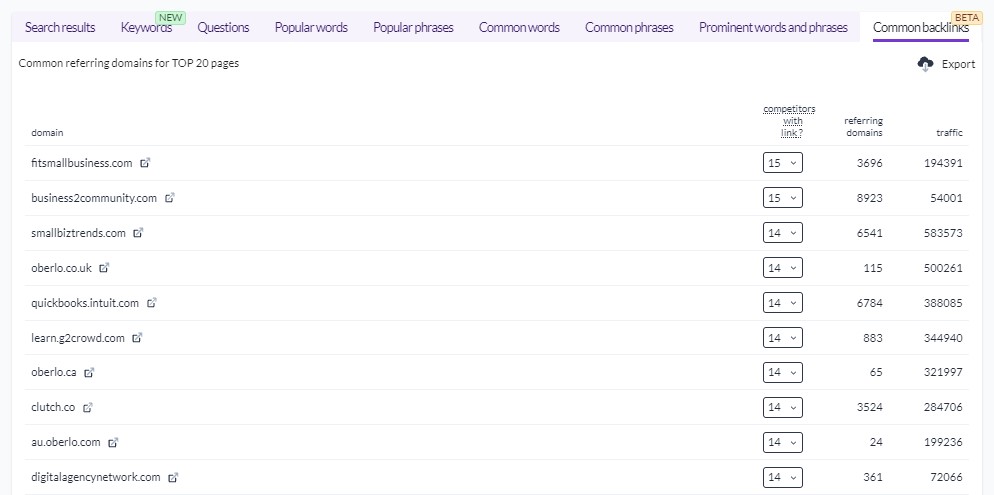
4. SEO Audit
The SEO Audit tool in Surfer provides a fast, convenient way to evaluate your content's performance against top-ranking competitor pages.
This tool compares your content on multiple key factors, helping you identify optimization opportunities and areas for improvement. Key metrics analyzed in the SEO Audit include:
- Content Score: Assesses the overall quality and relevance of your content.
- Missing Common Backlinks: Backlink opportunities based on competitor profiles.
- Internal Links: Suggests internal linking improvements for better site structure.
- Terms to Use: Recommends keywords and phrases for optimal relevance.
- Word Count: Provides ideal content length based on competing pages.
- Exact & Partial Keywords: Evaluates keyword usage density and distribution.
- Page Structure: Suggests adjustments to headers, paragraphs, and images.
- Title & Meta Description Length: Ensures ideal length for SEO effectiveness.
- Page Speed, Time to First Byte, Load Time: Monitors loading speeds for better user experience.
With these insights, the SEO Audit tool helps you fine-tune your content to meet or exceed industry standards and achieve better search performance.
Content Score in SEO Audit
The Content Score chart visually compares your page's score to that of competitors, providing a target range for improvement. This score indicates how well your content aligns with Google’s ranking criteria.
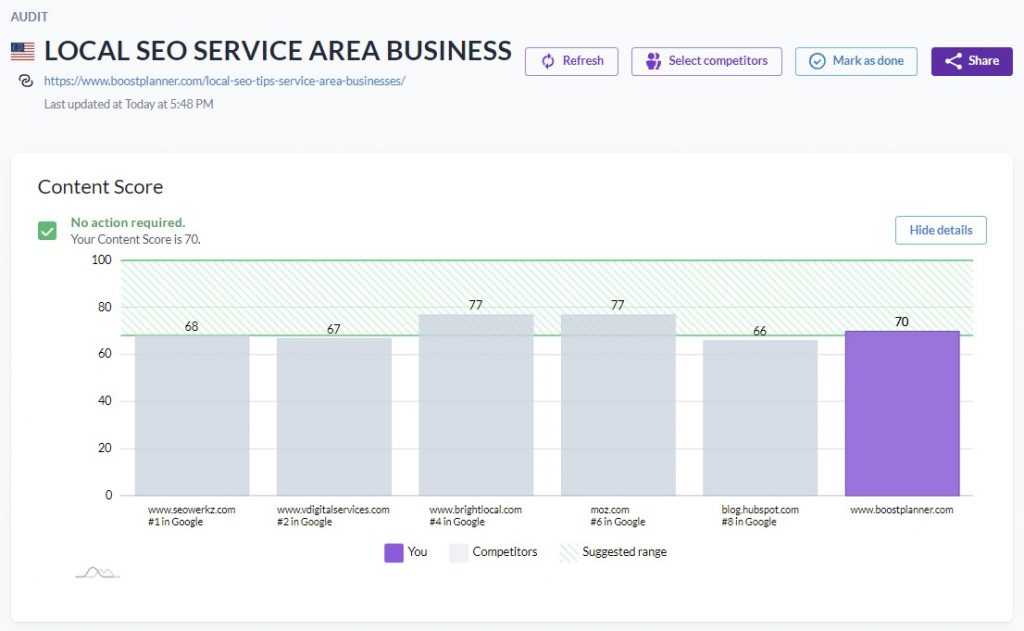
Missing Common Backlinks in SEO Audit
This section identifies backlinks that competitors have but your content lacks. These are potential link-building opportunities to increase authority and relevance for your page.
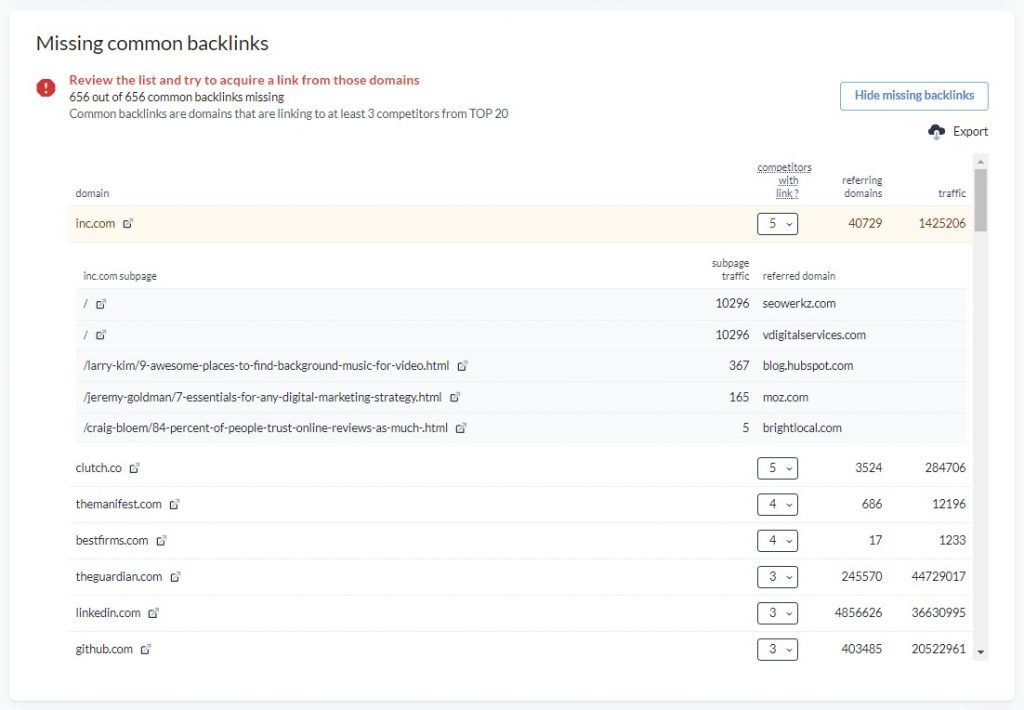
Internal Links in SEO Audit
Surfer’s internal link suggestions help you identify opportunities to add links from other pages on your site. Hover over each suggestion to see a snippet where you could insert a link for better site navigation and topic connectivity.
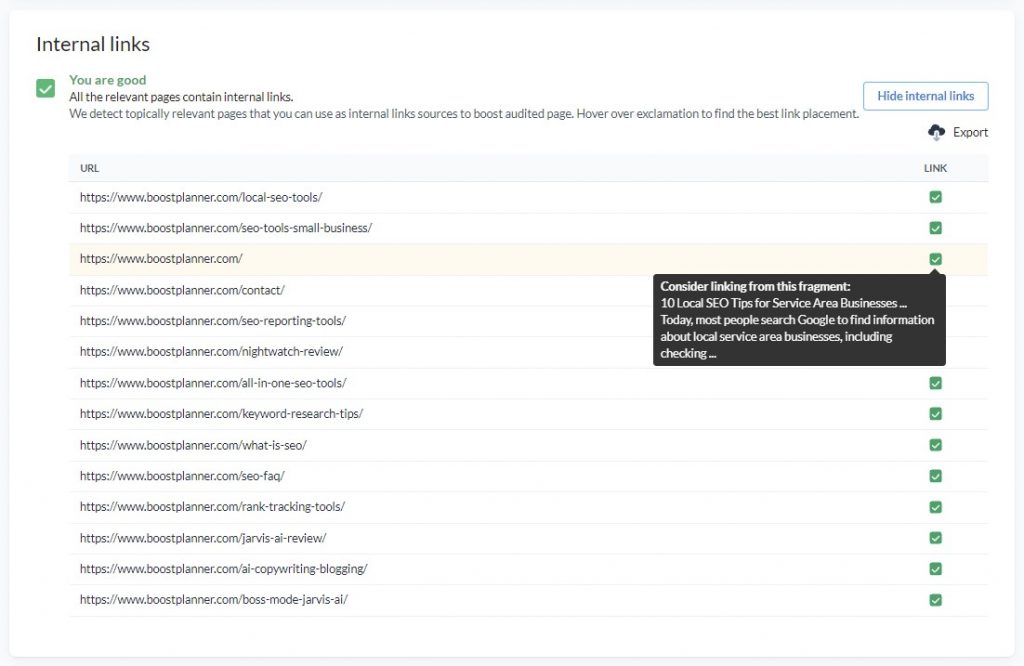
Terms to Use in SEO Audit
This section lists important terms to include, based on competitor analysis and NLP insights. For each term, you’ll see example sentences from competitor content, usage frequency, suggested usage range, sentiment, and relevance, guiding you on where and how to use them effectively.
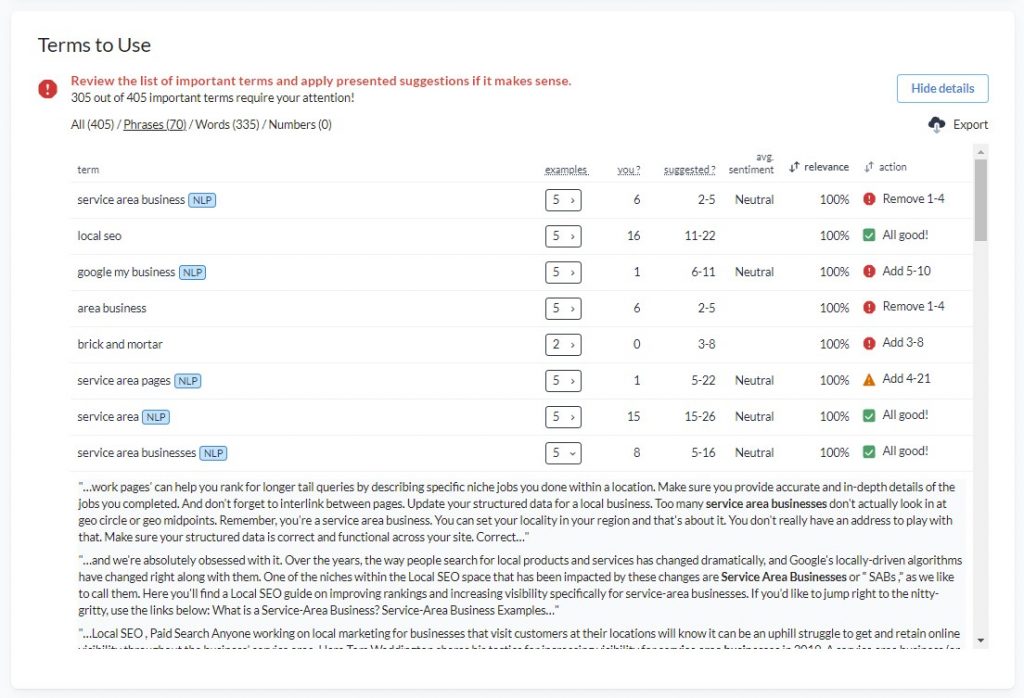
Word Count in SEO Audit
The Word Count metric provides recommendations for adjusting the length of your content. Surfer suggests word count targets for the overall body, headers, and specific sections, based on competitor averages.
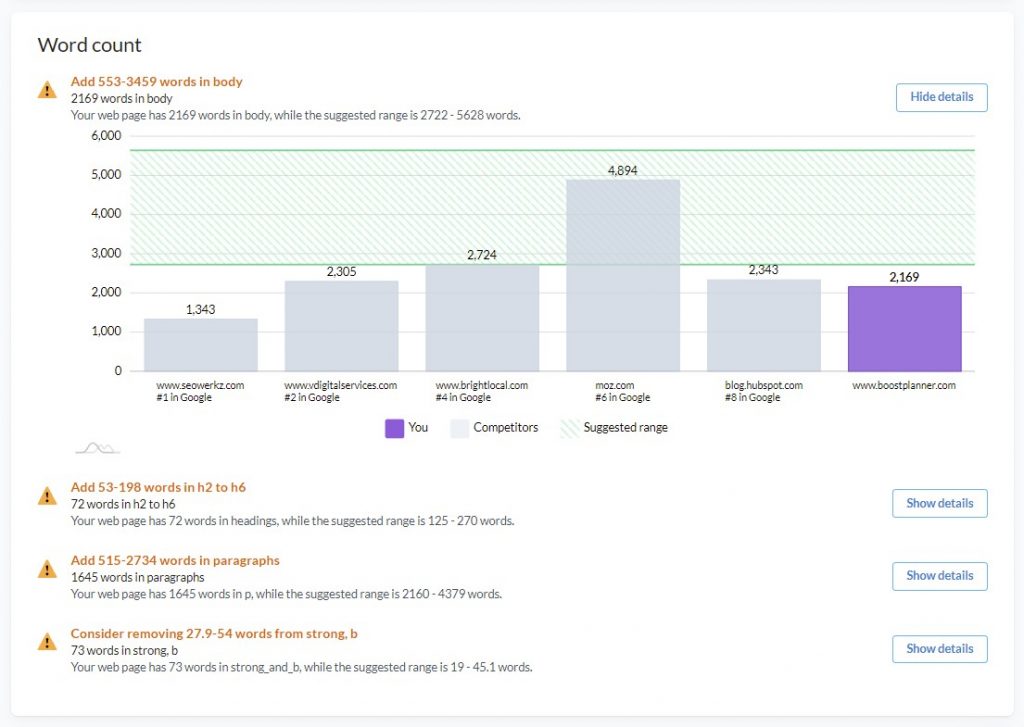
Exact Keywords in SEO Audit
This metric examines the exact match of your target keyword across different sections of your content. Surfer provides recommendations on where to add or reduce usage based on competitor data.
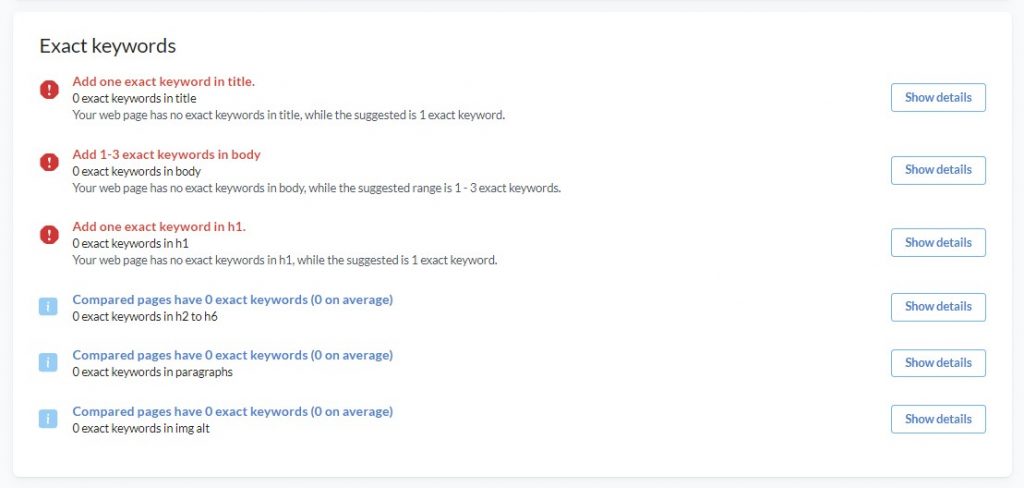
Partial Keywords in SEO Audit
Similar to the Exact Keywords metric, this section looks at partial matches of your keywords. Surfer suggests adjustments based on keyword density in competitor pages.
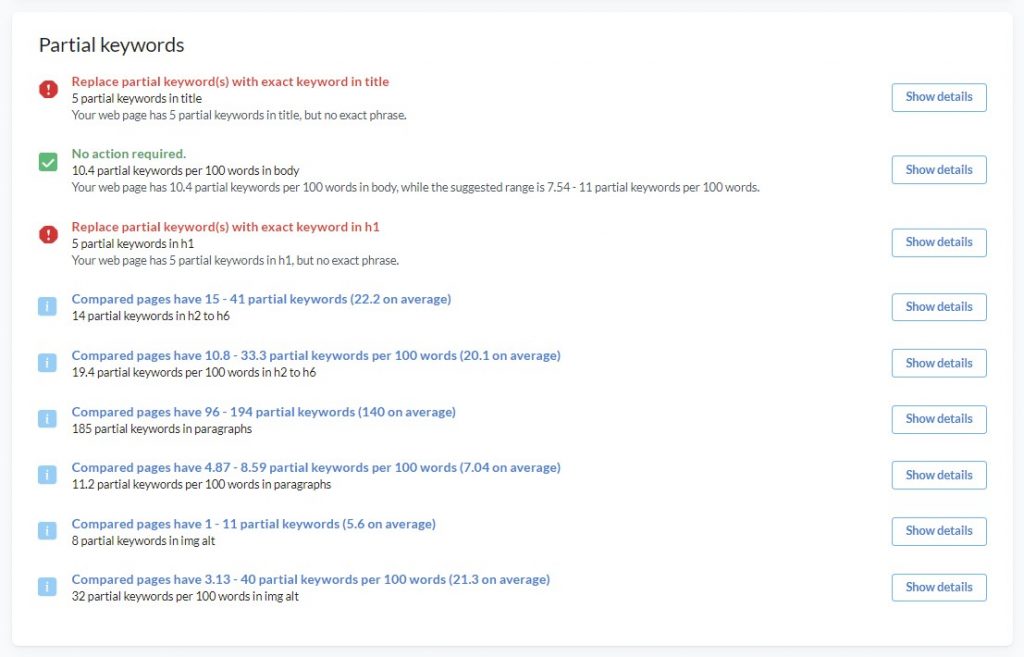
Page Structure in SEO Audit
Surfer provides page structure recommendations, such as adjusting headers, paragraphs, and images, to align with top-ranking competitor layouts.
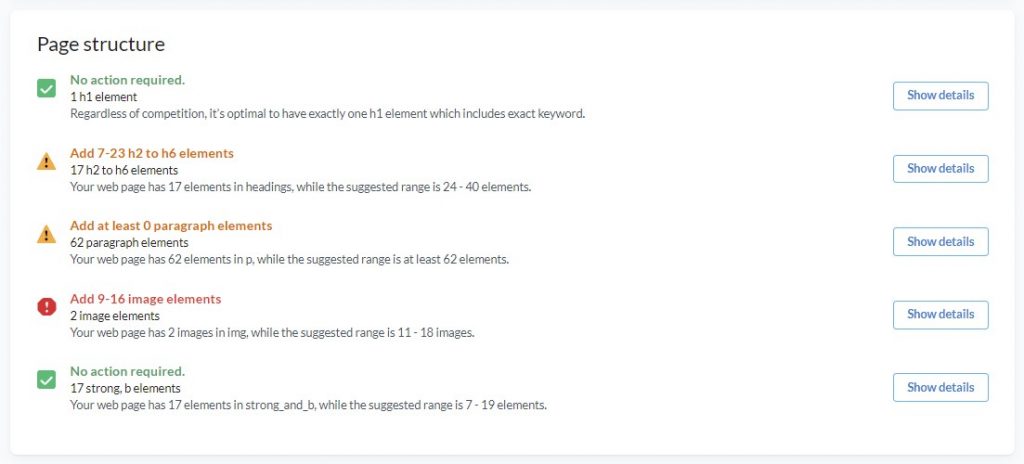
Title & Meta Description Length in SEO Audit
This section ensures your title and meta description meet optimal length requirements. Surfer recommends adjustments to help make your content more clickable and SEO-friendly.

Time to First Byte & Load Time in SEO Audit
The final metric assesses load time, including Time to First Byte (TTFB) and overall page load speed, to ensure your page provides a fast, seamless user experience, which is critical for both SEO and user retention.

5. Keyword Research
Surfer's Keyword Research tool is a valuable addition to its suite, designed to help you identify high-potential keywords for your content strategy. While it may not offer the exhaustive capabilities of standalone keyword research tools, it integrates seamlessly with Surfer's other features, making it highly useful for on-page SEO and content planning.
Setting Up the Keyword Research Tool
To start, enter one or multiple keywords, and Surfer generates a Keyword Research Table with relevant data.
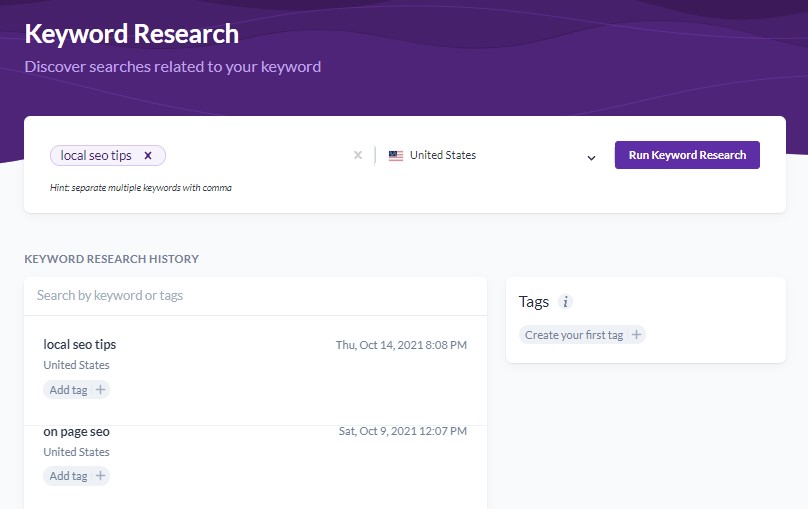
Keyword Research Table
The table includes key information for each keyword, such as SERP similarity and estimated monthly search volume, and organizes results into three main categories:
- Similar Keywords: Keywords ranked by at least two of the top 20 pages for the main target keyword, providing insights into terms that competitors are also ranking for.
- Related Terms: Keywords that contain the same primary terms as the target keyword, which can help you expand on related topics within your content.
- Questions: Frequently asked questions that at least two of the top 20 pages are ranking for, helping you discover potential question-based keywords to address in your content.
Each keyword in the table can be set as a new target for further research or saved to the clipboard in the left sidebar for later analysis, allowing you to quickly organize and revisit your findings as needed.
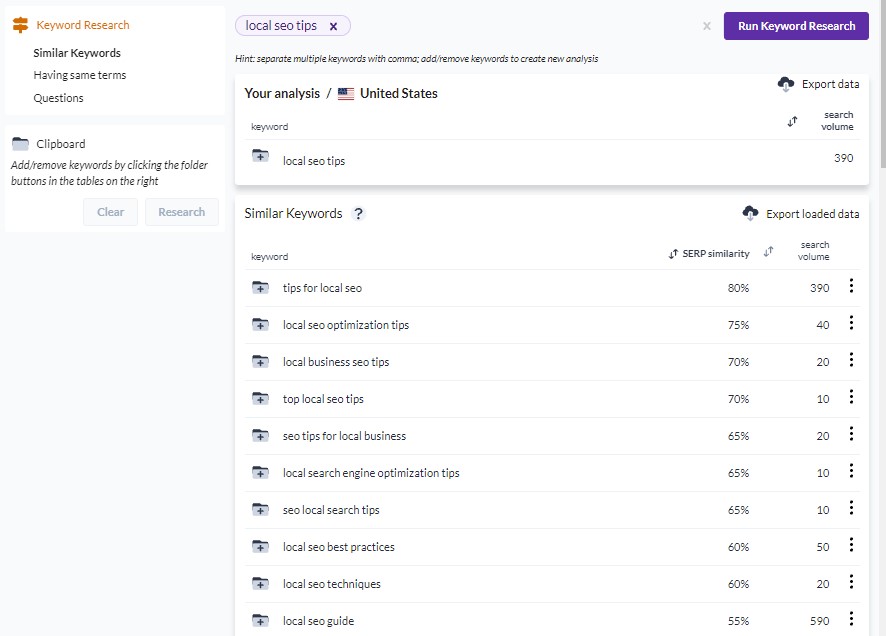
6. Keyword Surfer
Keyword Surfer is a 100% free Chrome extension provided by Surfer SEO. With Keyword Surfer, you get free keyword data like search volume data, keyword ideas, and more.
When you enter a search query in Google, the tool will show you the estimated monthly search volume for your query and estimated CPC (cost-per-click) if you were to run Google Ads targeting the query.
This search data helps to quickly check if a keyword phrase is worth creating content around based on search demand and bidding competition.
Below each title link in the search result snippets, Keyword Surfer shows you:
- Estimated monthly traffic to the domain in the United States.
- Number of words on the page.
- The number of exact keywords used on the page.
- If Google changed the title for the search results. You can hover over “Title changed” to see the original title of the page in a tooltip.
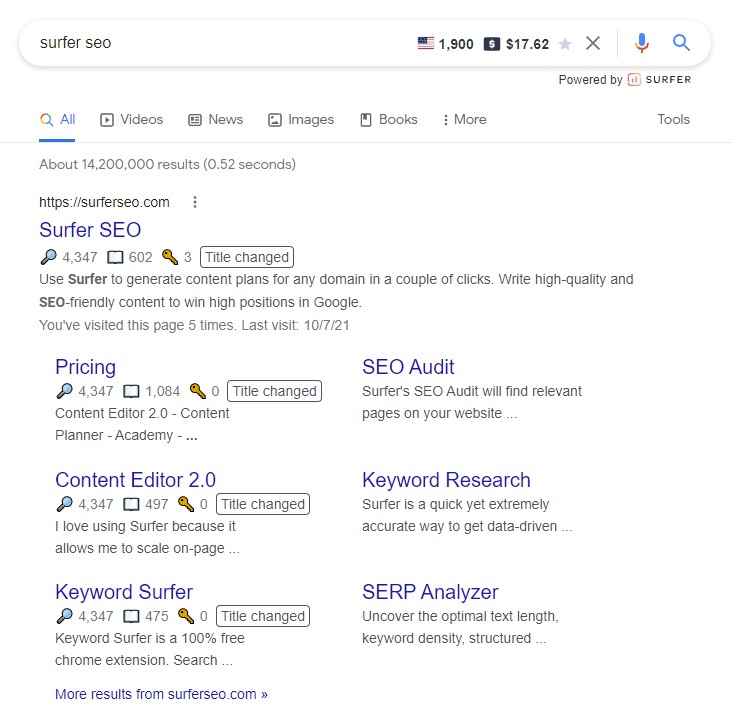
Keyword Ideas & Correlation Charts in Keyword Surfer
Along with the above features, Keyword Surfer gives you related keyword ideas and correlation charts in a panel on the right-hand side of the search results.
The correlation charts are useful for gaining a quick glimpse of domain traffic, page word count, and exact keywords used across the top 10 ranking websites.
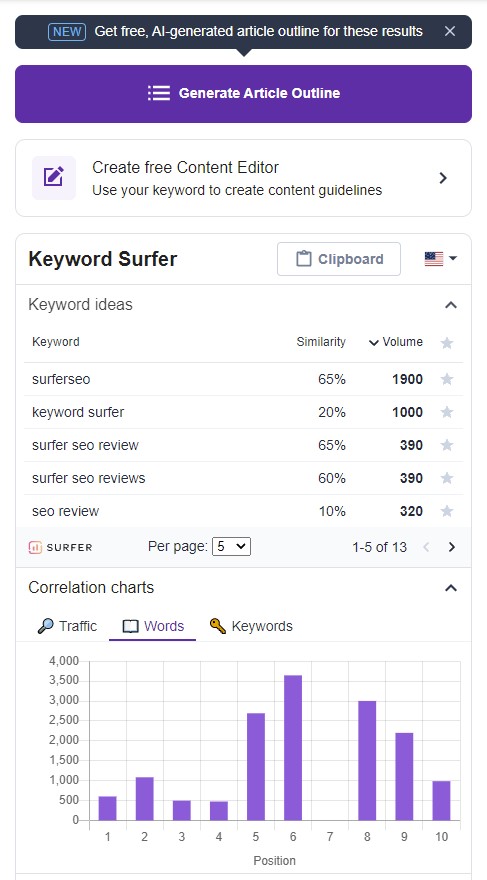
Clicking on “Create free Content Editor” will let you try out the Content Editor with a limited set of suggested terms to use based on the search query entered.
If you click on the Generate Article Outline button, Surfer provides a free AI (artificial intelligence) article outline generator.
With a Surfer Pro account, Surfer generates optional unique paragraphs you can copy and paste into your content in the Content Editor.
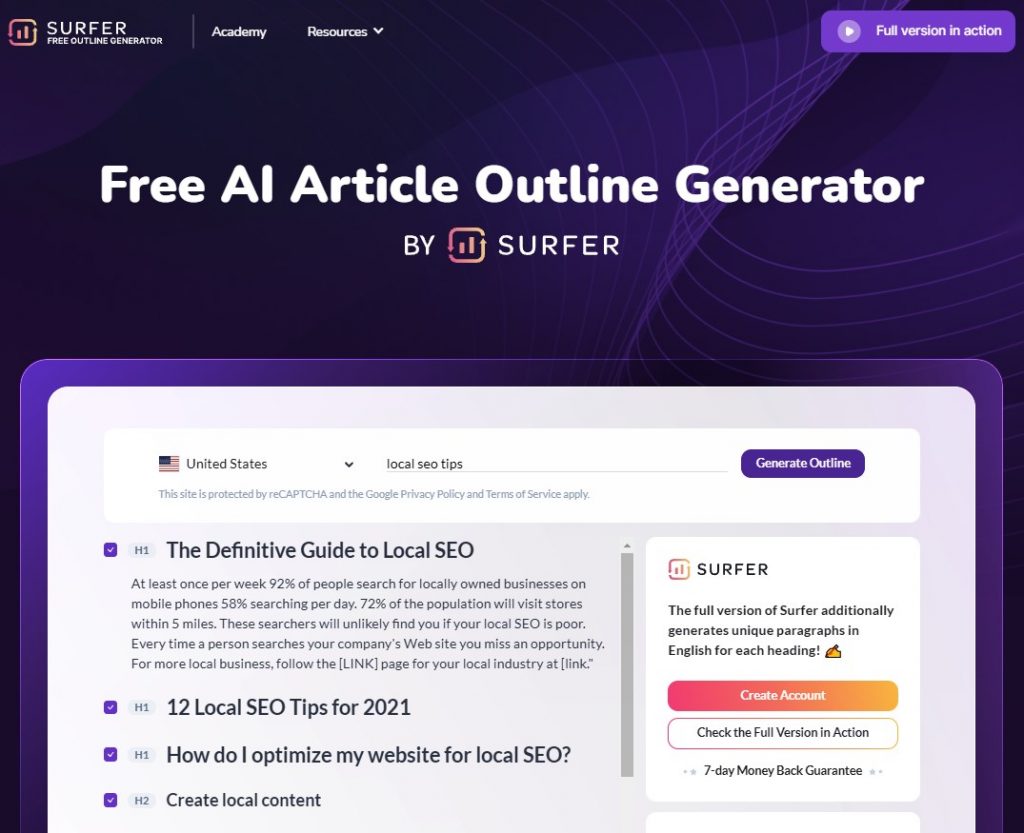
7. Content Audit
Content Audit is an integral part of Surfer SEO’s toolkit, offering comprehensive insights and recommendations to optimize existing content for better search performance.
With Content Audit, Surfer subscribers can identify content gaps, enhance user experience, and improve search rankings by analyzing key metrics such as content score, position, click-through rate (CTR), and traffic.
After connecting to Google Search Console, users receive personalized weekly recommendations directly to their email. These insights highlight the best SEO opportunities across your site, such as suggested internal links, keywords to incorporate, and content to refresh.
Content Audit also provides automatic updates, tracks ranking changes, and identifies quick SEO wins, helping you stay ahead in search engine results.

Key Features:
- Quick and Targeted Optimization: Find the highest-impact opportunities for improving existing content.
- Content Performance Monitoring: Daily tracking and alerts for performance changes, so you can respond quickly.
- Auto-Optimize and Internal Linking: Easily update content with Surfer’s suggestions to improve rankings and fill content gaps.
- SERP-Based Insights: Stay informed with fresh recommendations based on current top-ranking content.
Content Audit enables SEO-focused teams, freelancers, and agencies to keep content relevant and effective, all within a single, streamlined platform.
Surfer SEO Alternatives
Here are three popular Surfer SEO alternatives for SEO content writing software that can help with content optimization to improve rankings and search engine visibility:
1. Semrush
Semrush is a reputable complete SEO platform and popular alternative to Surfer SEO.
Semrush includes a comprehensive on-page SEO checker that detects semantic keyword ideas, and other suggestions to improve your website content, SEO strategy, backlinks, technical issues, and user experience.
Surfer SEO vs. Semrush
Compared to Surfer, Semrush provides a more complete SaaS platform with tools and features for digital marketing, content marketing, SEO, PPC, and social media.
Examples include more extensive keyword research tools, deep competitor insights with backlink analytics, a daily rank tracker, and a report builder with many templates.
However, Surfer offers the most advanced capabilities for on-page optimization and being aware of the most relevant and impactful terms to add to your content.
The two SEO software tools actually complement each other well if you utilize Semrush for deep research, rank tracking, and reporting, and Surfer for content optimization.
Check out my in-depth Semrush review and the latest pricing plans to learn more.
2. SE Ranking
SE Ranking is a popular all-in-one SEO software that includes an effective on-page SEO checker as part of their affordable pricing plans.
Check out this SE Ranking review and pricing plans for more details.
Surfer SEO vs. SE Ranking
SE ranking is an excellent all-in-one SEO tool that provides some of the lowest plan costs for the feature set on the market.
Also a Semrush alternative, SE Ranking includes all the major keyword and competitor research tools common in SEO platforms as well an on-page SEO tool.
However, Surfer provides much more comprehensive on-page audits and suggestions for improving your content.
3. Frase
Frase is a content optimization software that provides features for researching, writing content and briefs with AI, and optimizing written content.
Surfer SEO vs. Frase
While not as robust as Surfer in terms of content analysis features and data, Frase has helpful content generation features and continues to improve and expand.
Surfer SEO FAQs
What is Surfer SEO Content Editor?
The Surfer Content Editor provides guidelines to comprehensively cover the topic you're writing on.
The content editor generates a list of words, phrases, headlines, and questions to optimize your content based on analyzing the top-ranking pages for your main keyword phrase.
How Does Surfer SEO Work?
In regards to the content editor guidelines and audit tools, Surfer SEO works by analyzing the content of a page (for a given keyword or set of keywords) against 500+ on-page signals.
Alongside this main functionality, Surfer SEO also includes content planning and keyword research tools.
What is a Good Surfer SEO Score?
The Surfer SEO team recommends aiming for a score of 70 or greater. A high score between 67 and 100 indicates optimum quality and relevance in relation to the main keyword you are targeting.
Is Surfer SEO Free?
Surfer is not free. However, if after using Surfer for 7 days you're not satisfied, you can contact their support team via chat or email to process a refund request.
You can extend the money-back guarantee to 30 days by sharing feedback on how Surfer can be improved.
The team at Surfer offers a free browser extension tool though, called Keyword Surfer for getting keyword ideas with search volume data. The extension is described above in more detail.
How Much Does Surfer SEO Cost?
Surfer SEO pricing plans start at $99 per month.
With an annual subscription, you can get the Essential plan at a rate of $79 per month (save $240).
The mid-tier Scale plan costs $219 per month.
Does Surfer SEO Offer a Discount?
Surfer offers a discount if you sign up for an annual plan, which is 20% off the monthly plan rate.
Does Surfer SEO Offer a Free Trial?
No, but Surfer currently offers a 7-day money back guarantee.
Surfer SEO Review Conclusion
Surfer SEO stands out as a powerful tool for data-driven on-page optimization, helping content creators and marketers improve rankings with actionable insights and advanced analysis. Its unique features, like the Content Editor and SERP Analyzer, make Surfer a valuable asset for those serious about SEO.
Visit the Surfer SEO site to explore their plans and discover how the tool can boost your content’s performance.